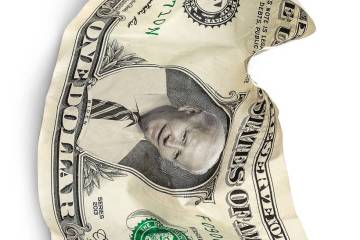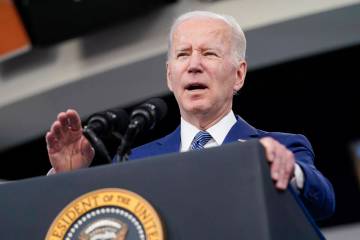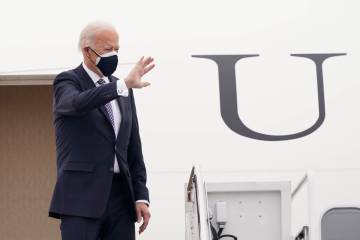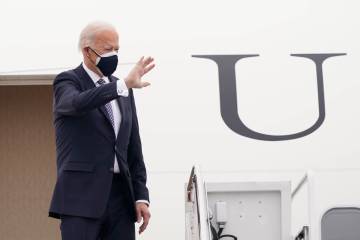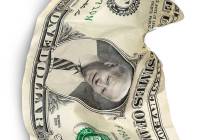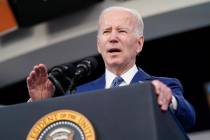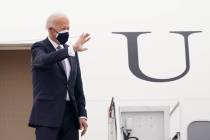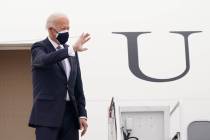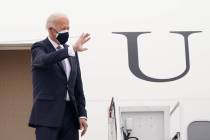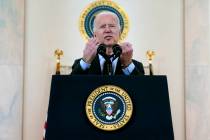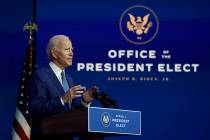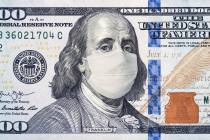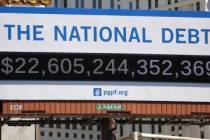RICHARD A. EPSTEIN: Real recession worry should involve progressive economic policies
Conventional wisdom holds that the outcome of presidential elections turns on the state of the economy. Thus far, notwithstanding some conspicuous ups and downs, the Trump administration should reap the benefits of a positive economic performance.
Nonetheless, a faction of observers thinks a major recession is in the wings. Its expected arrival date is next year, just in time to wreak havoc in the 2020 election. The angst covers the usual suspects: the trade war with China, climate change, Brexit tumult and European Union stagnation. In contrast, my list stresses differences on economic policy between Trump and his progressive Democratic opponents.
First, Trump’s handling of the China issue counts as a serious negative. He was wrong to stay out of the Trans-Pacific Partnership (TPP), which would let the United States keep its leadership role in the expanding Asia/American market. But by the same token, the Democrats are, if anything, worse on this score. Their opposition to the TPP rests on their ongoing protectionist project for strong labor and environmental guarantees. But trade issues have dogged us for years, and a continued impasse will create senseless dislocations, but no Trump recession.
In the domestic economy, the Trump deregulation program has already paid handsome dividends. Free trade in domestic markets works as well as in international ones. There is no adroit combination of industry-specific subsidies and taxes that can do half as well as a program that rejects both these dangerous tools.
Our relatively free economy increases the velocity and value of trade, with these welcome results: higher national gross domestic product and improved labor participation and wages, especially among marginal groups — teenagers, minorities, ex-cons. The fastest way to reverse this trend is to revert to the interventionist Obama era, which the progressives are too eager to do.
The overall domestic situation would be still better today if state-level initiatives had not roiled local economies. State laws setting the minimum wage at $15 are one example.
The foolish decision of the California Legislature to reclassify independent contractors as employees will not only wreck the business models of Uber and Lyft, but it will also throw legal monkey wrenches into countless other tech and service industries. Of course, the exit option tends to blunt the effect of these state maneuvers, but even these transitions take time. But let similar reforms take hold at the federal level in a Democratic administration, and its dire consequences could hasten the arrival of the next recession.
Many economists and observers also systematically underestimate the importance of major structural reforms in key industry sectors. Global warming as it relates to energy policy is a higher stakes game. Trump should do well against his Democratic rivals by maintaining his general skepticism on climate change legislation, notwithstanding the near hysterical progressive calls to undo the capitalist system. Stopping fracking, canceling federal oil leases and high energy taxes are the road to perdition.
The correct strategy is to expand the use of natural gas because it is both cheap and clean. Any hasty shift to wind and solar would require major investments in intermittent energy sources, obtainable only through an endless array of solar panels and windmills that carry their own environmental baggage. The overall loss in jobs and net productivity would be staggering, and for no perceptible environmental gain — which will come only, if at all, when China reduces its greenhouse gas footprint, which now exceeds that of the United States and the European Union combined. And the political costs damning fossil fuels would be every bit as high, for only abundant American energy cushions the blow from further disruptions in Saudi Arabia and Iran. Why give Russian President Vladimir Putin the power boot on the throat of the world economy by strategically cutting off supplies?
Similarly, the constant progressive proposals to either shut down the private health care industry or seriously circumscribe its reach will do little to help the position of the least advantaged, who will be locked into an ossified health care system that will be difficult to navigate. In addition, that precipitous reform will seriously disadvantage the tens of millions of individuals who are content with their own private health care systems.
As in so many other areas, the progressive approach to failed industries is to double-down on regulation. Yet the correct approach is rapid deregulation, which relies on competition, choice and innovation to improve the overall situation. All too often Republicans are wobbly on this issue, which helps explain the rising costs of government-run systems such as Medicare and Medicaid. But the grandiose proposal of “Medicare for All” is the best guarantee for inferior medical services for all, as any government system is largely clueless on how to purchase equipment, hire physicians or prioritize treatment for 325 million people. Reserve your place on the health care queue now.
Those prospects, moreover, won’t be diminished if the next progressive administration restores high marginal tax rates, a robust estate tax and a new-fangled wealth tax to fund a massive set of new benefits. This would be an ideal way to kill productivity.
Trump is no angel on deficit spending because his populist streak leads him to be an inconstant guardian of the public fisc. But on a comparative basis, his indiscretions are small potatoes. The progressives will tax and spend as if there were no tomorrow. Nor will they confine their attention to taxes alone.
Most notable is Elizabeth Warren’s harebrained scheme for partial de facto nationalization of all corporations whose net worth exceeds $1 billion. She would achieve this by arrogating to the federal government the power of 40 percent of the seats to other “stakeholders,” including union leaders and community representatives. The net paralysis will make matters even worse.
Indeed, the greatest risk here regarding a major economic downturn is that the undeserved influence of those stoking fears of a Trump-made recession could lead to a serious depression by helping progressive Democrats win the White House.
— Richard A. Epstein is a professor at the New York University School of Law, a senior fellow at the Hoover Institution and a distinguished service professor of law emeritus and senior lecturer at the University of Chicago. His Review-Journal column appears monthly.




